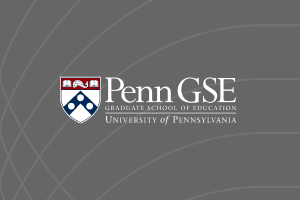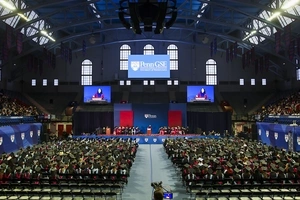Every 3.2 seconds, someone in the world develops dementia. For Truth Mjumbe, a second-year student in Professional Counseling, the statistics are not abstract. He has personally faced memory challenges connected to epilepsy, his grandfather lives with dementia, and he has seen how memory loss disproportionately affects older Black adults. Those realities shaped Recall Aid, an AI-powered memory support tool he began building as an undergraduate at Morehouse College in Atlanta, Georgia, and continues to refine at Penn GSE.
“Memory isn’t just about the past. It’s about connection, dignity, and the ability to share who you are,” Mjumbe said. “I wanted to create something that could make those connections vivid and personal, while also being safe and accessible.”
Growing up in New Jersey, Mjumbe was drawn to listening and helping others. At Morehouse, he majored in psychology and minored in computer science, graduating Phi Beta Kappa and joining Psi Chi, the international psychology honor society. He began experimenting with ways technology could help him compensate for memory gaps linked to epilepsy.
“I realized that when someone reminds you of a moment, a flood of detail comes back almost instantly. That’s called cue-dependent memory,” he explained. “I wondered, what if AI could provide that kind of cue? Could we build a tool that helps people recall their own stories in that same natural way?”
Working with Morehouse’s Institutional Review Board (IRB), Mjumbe tested early versions of Recall Aid on fellow students. After submitting the concept to Microsoft, he received $150,000 in funding to advance the project. Later, JPMorgan Chase also provided support.
Recall Aid does more than prompt recall. It incorporates culturally familiar voices and personalized storytelling, addressing the reality, as shown by research from the National Institute on Aging, that dementia affects Black Americans at nearly twice the rate of white Americans. For Mjumbe, that commitment is both professional and personal.
“My grandfather’s experience with dementia made this urgent,” he said. “But it is also about a larger community need. Too many stories disappear before they are told.”
That insight connects directly with the work of his father, Reverend Lukata Mjumbe, executive director of the Alabama African American Civil Rights Heritage Sites Consortium. Rev. Mjumbe’s mission is to preserve untold histories from communities across Alabama. Father and son have collaborated on pilots that used Recall Aid with elders in Birmingham. Participants described the experience as transformative.
“People were blown away,” said the younger Mjumbe. “One elder told us he had never seen AI used in this way, and that it gave him a platform to share memories he thought were gone forever.”
Recall Aid’s collaborations continue to expand. In partnership with the Movement, Memory, and Justice Project at Morehouse College, the platform recently supported a storytelling session at Freewoods Farm in South Carolina’s Gullah Geechee corridor. During the program, Howard University student Luca Crowley facilitated a discussion with Freewoods Farm founder O’Neal Smalls using AI-generated prompts created by Recall Aid. The questions were shaped by memory science and tailored to Smalls’s lived experiences, centering on Benjamin E. Mays, the struggle for integration, and the legacy of student activism.
As Smalls reflected, his “Memoflection” captured how those moments shaped his understanding of communication, leadership, and community. He recalled the Saturday morning breakfasts at National Bar Association conventions where Mays spoke, describing how “his voice, rich and commanding, resonated deeply” and how his message of “carrying the bones” became a lifelong reminder to honor the past and give voice to those who came before.
“The Freewoods Farm program was a moment of intergenerational dialogue,” Mjumbe said. “It showed that Recall Aid can do more than help people remember. It can preserve the lessons and language that connect generations.”
At Penn GSE, Mjumbe has found a home where his academic interests in therapy and human development intersect with his entrepreneurial drive. A master’s student in the Professional Counseling program, he provides counseling to adults over 55 as part of his fieldwork. That hands-on practice informs his vision for Recall Aid.
Through Catalyst @ Penn GSE’s virtual accelerator, Catapult, he gained structure for developing the app and learned directly from interviews with elders. A mixed methods course helped him design a proposal to bring Recall Aid into eight Philadelphia nursing homes, outlining a timeline, measures, and implementation plan.
“Talking with people in the community gave me insights I could never have gotten on my own,” he said. “Penn GSE helped me see how to move from an idea to something that could scale responsibly.”
Set to launch this December, Recall Aid uses reminiscence therapy principles combined with advanced AI. A user can share a seed memory, such as “the time I fell off my bike,” and the system generates cue-based questions, first-person narrative summaries, and vivid images. Features such as Memoflection, Memory Recall Network, and AI-powered Memory Stacking make each recollection more detailed and more personal.
“Reminiscence therapy is powerful, but it is expensive and often inaccessible,” Mjumbe said. “Recall Aid bridges that gap by using AI for good. It is about giving people access to a safe and dignified way to protect what matters most.”
Media Inquiries
Penn GSE Communications is here to help reporters connect with the education experts they need.





